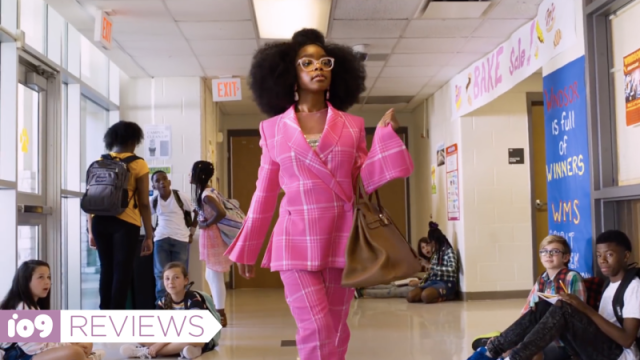Tina Gordon’s Little plays with a fantasy most adults have had at one point or another: What would it be like to go back and breeze through our childhoods equipped with all of our adult knowledge?
It would be so easy, we all imagine, if the only things we had to worry about in life were homework and the shark-infested waters of preteen social life.
But for Jordan Sanders (Regina Hall), the neurotic, hyper-aggressive technologist at the centre of Little, it’s not easy at all. Little introduces us to Jordan at two points in her life: the past, when she was still an optimistic but slightly dorky youth portrayed by Marsai Martin, and the present, where she’s become an abusive bully as a result of having been picked on as a child.
After being humiliated in front of the entire school in a flashback, Jordan commits herself to being as mean as she possibly can to everyone she meets in order to make sure they don’t hurt her first.
Because she’s brilliant and her talents as a boss (it’s never really explained what her company produces aside from ill-defined “apps”) are undeniable, she’s risen through the ranks in her field. And all of her employees begrudgingly accept that their boss is a walking, talking HR complaint with an impeccable wardrobe.
The only real friends Jordan’s got come in the form of her harried assistant April (Issa Rae) and HomeGirl (Tracee Ellis Ross), a HomePod/Alexa-like smart-home assistant Jordan invented.
As lonely as it is at the top, Jordan isn’t particularly pressed with changing her ways because being a bully’s largely paid off for her.
She’s got basically everything she wants and Little wants you to understand that she’d be perfectly fine if a little girl’s magical curse never transformed her into a child.
Little isn’t really a movie about Jordan learning all that much about herself, but rather about realising truths about the people around her.
Little isn’t without its fair share of scenes that’ll make you chuckle, but like so many films these days, it suffers from most of its best moments all having been crammed into trailers you’ve already seen.
If, somehow, you manage to walk into a theatre having seen nothing of the movie, its humour’s likely to be more than enough to carry you through the predictable plot, but if that’s not the case, you’ll find yourself perhaps smiling, but not outright laughing.
If you have seen the trailer, then you more or less know how the film plays out. Jordan runs afoul of a girl who seemingly has actual magical abilities, and wakes up one morning as a young girl again.
Though April’s willing to help her hide her secret as long as possible, child protective services make it clear that the young Jordan’s got to be enrolled in school and, unsurprisingly, she has a difficult time fitting in.
Being forced to go back to the same school where she endured so many years of teasing and torment for being different puts Jordan into a position of vulnerability she’s spent so much time trying to avoid, and emphasises the idea that the issues kids deal with aren’t necessarily “easier” than the ones adults deal with, they’re just different.
Clapping back at a bratty child whose crowning achievement is making it into middle school is easy enough, but it doesn’t really matter if said brat still has the ability to turn you into a social pariah in the place where you’re forced to spend the bulk of your time.
What Jordan comes to learn is that no matter how hard she tries to exert her will over her situation, the thing she’s meant to come away understanding is that sometimes, the only thing you’ve really got control over is yourself and that’s what you have to hold on to.
While Hall and Martin’s performances as Jordan are both sharp and chuckle-worthy (save for one very distasteful transphobic joke casually dropped to emphasise how much of an arsehole adult Jordan is), there’s a subtle unevenness between their deliveries that breaks the illusion of them being the same person.
Different as Martin’s energy is from Hall’s, she’s able to channel the swagger of an adult power player from scene to scene, but also telegraph the moments when a particular slight’s cut Jordan deeper than she expected. Little also makes the solid decision of never letting Jordan fall into the trap of becoming too close with the kid friends she makes or forgetting that she’s definitely still a grown arse woman.
Though the experience certainly humbles her, she never loses sight of her desire to get back to living her adult life.
April feels like a character plucked from the background of Rae’s HBO show Insecure, which is to say that she’s charming and has excellent on-screen chemistry with literally everyone as she gets wrapped up in the wildness of her boss’ magical transformation.
Though she’s sympathetic to Jordan’s predicament, April also sees it as an opportunity to push for her own professional advancement during Jordan’s leave of absence from the office, while Jordan can only see it as the end of the world.
After years of building herself up big and strong, Jordan’s right back where she started, and confident as she is, she can’t help but fear that she’s going to be stuck as a child forever.
The great thing about getting older is being able to look back on your younger self and knowing that you’ve overcome whatever obstacles might have given you trouble in the past, but Little isn’t about Jordan relearning this fact after becoming a kid again.
It’s really just a straightforward story about how she comes to appreciate how much good she can do in the world by not following her own bullies’ examples, and letting people shine when their moment arrives.
